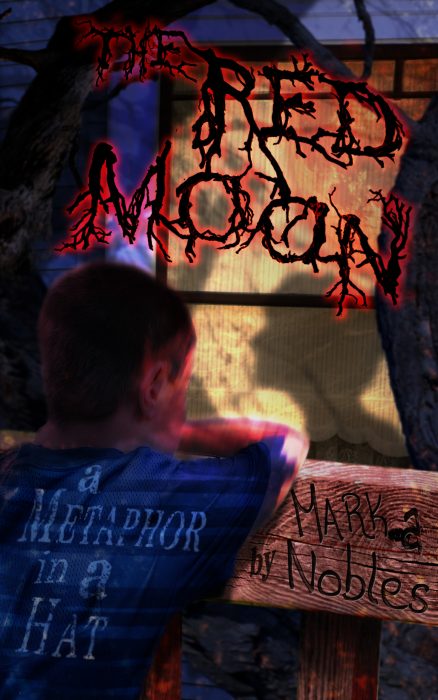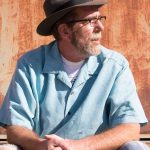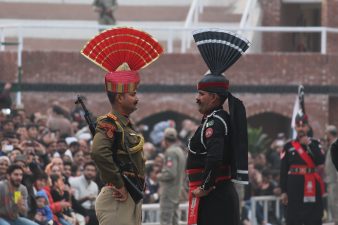Catapult Alumni
| Fiction
The Red Moon
My father turned into the driveway a little too fast, just like he always did. The Studebaker’s engine growled and the spring shocks squealed as my mother held her breath and closed her eyes, and my brother and I bounced in the back seat, almost hitting our heads on the roof. It was a Sunday […]
My father turned into the driveway a little too fast, just like he always did. The Studebaker’s engine growled and the spring shocks squealed as my mother held her breath and closed her eyes, and my brother and I bounced in the back seat, almost hitting our heads on the roof. It was a Sunday night, March 13, 1946, and we were returning home from church. It was a fine spring evening.
I remember the sermon that evening being especially fiery, even for Preacher Bonds. It had been a hell and brimstone, apocalyptic, God-fearing sermon and I had been particularly caught up while mother cried, father slept, and Jim, my younger brother, fidgeted.
Preacher Bonds was as charismatic a Southern Baptist preacher as ever lived. Southern Baptist work from the premise that a good Christian is a scared Christian, and they have plenty of good material from which to work. Few denominations can wring fear from the Bible as well as the Southern Baptists. I know what you’re thinking, but I don’t count the Catholics. They’ve had so many more years of practice that, for them, rule by fear is a centuries old art form.
Anyway, Preacher Bonds stayed pretty much in Revelations that night, and his voice was still ringing in my ears as the Studebaker coughed and died in the driveway, and we piled out into the late dusk of evening.
Jim looked up at the sky and pointed. “Look at the size of the moon tonight,” he said. I turned and looked up at the moon as it hung just over our neighbor’s roof. “And the color,” Jim said. “Look at the color.” It was red, blood red.
“And the stars shall fall from the sky,” said father as he reached down and scooped Jim up in his burly arms, “and the moon shall turn blood red,” he bellowed in his deepest voice. “Isn’t that what Preacher Bonds said about the start of the end times?”
Jim’s eyes got about as big as the moon.
“Bill,” mother said to father in her disapproving voice.
Father paid no heed to mother. “Yes, I believe he did,” he said, putting Jim back on the ground. He turned in a way that he didn’t have to look at mother and walked into the house.
Mother put her hand on my shoulder, and softly said, “Go on, into the house with both of you.”
I look back at that time and wonder why I didn’t notice the change as it was beginning. She was pale, my mother, and try as I might to remember now, I can’t recall when the life had gone from her voice, but it was already gone on that night. I was only ten, Jim only six, but looking back I wonder how I could have missed it, not seen it coming. Then, I spend an hour watching my own children at play in their backyard, and I realize children have no yesterdays or tomorrows, only today. It isn’t until adulthood that we try and string all those days together and look at the whole.
That night, after mother tucked us in, we lay in bed, quiet, but wide awake.
“Bent?” Jim said.
“Yes,” I answered.
“Is this it? Is this the end of the world or was Dad kidding?”
“Don’t know. Dad reads the paper and says the world has gone crazy and with what Preacher Bonds said about the end times, it could be.”
“Have you ever seen the moon red like that?” Jim asked. We couldn’t see the moon from our beds, but we could remember what it looked like out by the car and its light came rustling in through the curtains.
“Can’t say I ever remember it being red,” I said with all the wisdom and experience of my one decade of life.
“What should we do? I can’t go to sleep. If this is the end of the world, I don’t want to sleep through it.”
I knew where Jim was leading the conversation. Three summers ago father had built a treehouse in the Live Oak on the east side of the house. Jim hadn’t been allowed to climb it until this spring because he had been too small. It was still a new and secret place for him. We had sneaked out there at night a time or two before, but it was always a gamble because the Live Oak was on our parent’s side of the house, just a few yards away from their window, which stayed open to catch the breeze during the spring and summer. We had to be really quiet and being quiet did not come naturally to Jim.
“I don’t know, Jim. If this is Judgment Day, it might not be a good idea to be caught someplace where we’re not supposed to be.”
Jim didn’t say anything, but after about twenty minutes my imagination began to run away with me as well. If the world was coming to an end, I kinda wanted to be a witness.
“OK,” I said, “let’s go out to the treehouse, but…”
“We have to be really quiet,” Jim finished my sentence for me. “I know. I’m six, not stupid.”
Ours was a two-story, craftsman style, house with a wraparound porch that sat on the southwest corner of Race and Karnes streets. Because our house was a corner lot with a bigger yard, all the neighborhood kids came to our house to play. I really enjoyed the big yard until I grew strong enough to push a lawnmower.
All we had to do to get to the treehouse was climb out our window to the first story eave that encircled the house. Our bedroom was at the Southwest corner at the back of the house. Once on the roof, we would crawl down the backyard side, around the corner, and up the Karnes street east side until about three feet from our parent’s window, which was on the northeast corner of the house. There was a branch from the Live Oak strong enough and close enough for us to climb out and over into the treehouse. I don’t know if I truly believed that night was the end of the world, but I do know I believed that if mother had ever caught us on that ledge it would have been the end of the world for us, or at least for me. Jim, being the younger, might only have been maimed.
As we rounded the corner and started down Karnes street, I was quite surprised to find the light still on in our parent’s room. I almost decided to turn back. I thought the better of it because Jim was a few feet ahead of me, and he was afraid of heights. He was totally focused on not falling off the eave. I was afraid to say anything or to grab him suddenly for fear he might cry out. I decided to forge ahead, and we crawled into the treehouse with only one small scare. Once, Jim slipped a bit on the limb and rattled the branches regaining his balance. He was a pretty brave kid and although there was a scream in his eyes, not a sound passed his lips.
The treehouse had a ledge on the Karnes street side that the roof didn’t cover, so we stretched out side by side on our backs and looked up through the branches at the stars and waited.
They looked as secure in the heavens as ever and none fell as we watched.
Lying in the stillness I could hear my parent’s mumbled voices drifting out through their open window. I could only catch a stray phrase or two every few minutes and for a long time, I didn’t even pay attention. But after what must have been at least thirty minutes, I realized they were still up and talking. I began to wonder. It had to have been past midnight and mother and father didn’t usually stay up past ten, eleven at the most, even on a Saturday night, let alone a Sunday night.
“Jim,” I whispered, “what do you suppose they’re talking about this late.” Jim didn’t say a word and when I turned and looked at him, he was sound asleep. He lay there on his back with his mouth open, inhaling and exhaling the shallow, quick breathes of childhood.
I slowly sat up and peeped over the two by four railing and looked into my parent’s window. A thin wind briefly brushed back the curtain and I saw my mother sitting on the bed, holding her hands in her lap. I think she looked scared but that could be a detail that slipped into my memory over the many years since. As I sat there looking over the railing, my father passed back and forth by the window. Sometimes it appeared as if he was carrying things, maybe clothes, but I could not tell for sure. I could not make out their conversation. I sat and strained to listen and hoped for another small gust of wind to provide a glimpse of their discussion.
Father did most of the talking. Mother only saying a few words now and then. After a while father stopped pacing. I couldn’t see him any longer, so I assumed he sat down in the overstuffed chair in the corner, out of sight from the window.
They talked about me and Jim for a long time. Every once in awhile I’d hear ‘the boys’ mentioned or one of our names spoken. Mother kept talking about church and Preacher Bonds but I didn’t have to hear father to know how he felt about them. He never was much of a churchgoer.
That night seemed as if it passed in an hour. I sat in the treehouse knowing what was happening in my parent’s room was important but not thinking to guess what it might be. My pajamas began to get damp and sticky as the morning dew began to form.
I had fallen asleep, my head resting on my hands on the rail when I was startled to consciousness by the light turning out in my parent’s room. I raised up and was momentarily relieved, thinking they had finally gone to bed. I stretched out on my stomach and looked over the side of the treehouse towards Race street. I was going to lie there a few minutes to loosen some of the kinks out of my neck and back. After I was sure mother and father were asleep, I’d wake Jim and we’d crawl back to our own beds.
The sound of our front door opening perked my head back up. I heard the front door close flowed by footsteps across our porch and down the walk. A man carrying a suitcase walked east on Race heading towards Karnes. The man crossed Karnes and kept on walking until he disappeared into the orange glow of the rising sun.
The full moon became like blood, and the stars of the sky fell to the earth as the fig tree sheds its winter fruit when shaken by the gale; the sky vanished like a scroll that is rolled up, and every mountain and island was removed from its place.
Rev. ch.6 12-14






